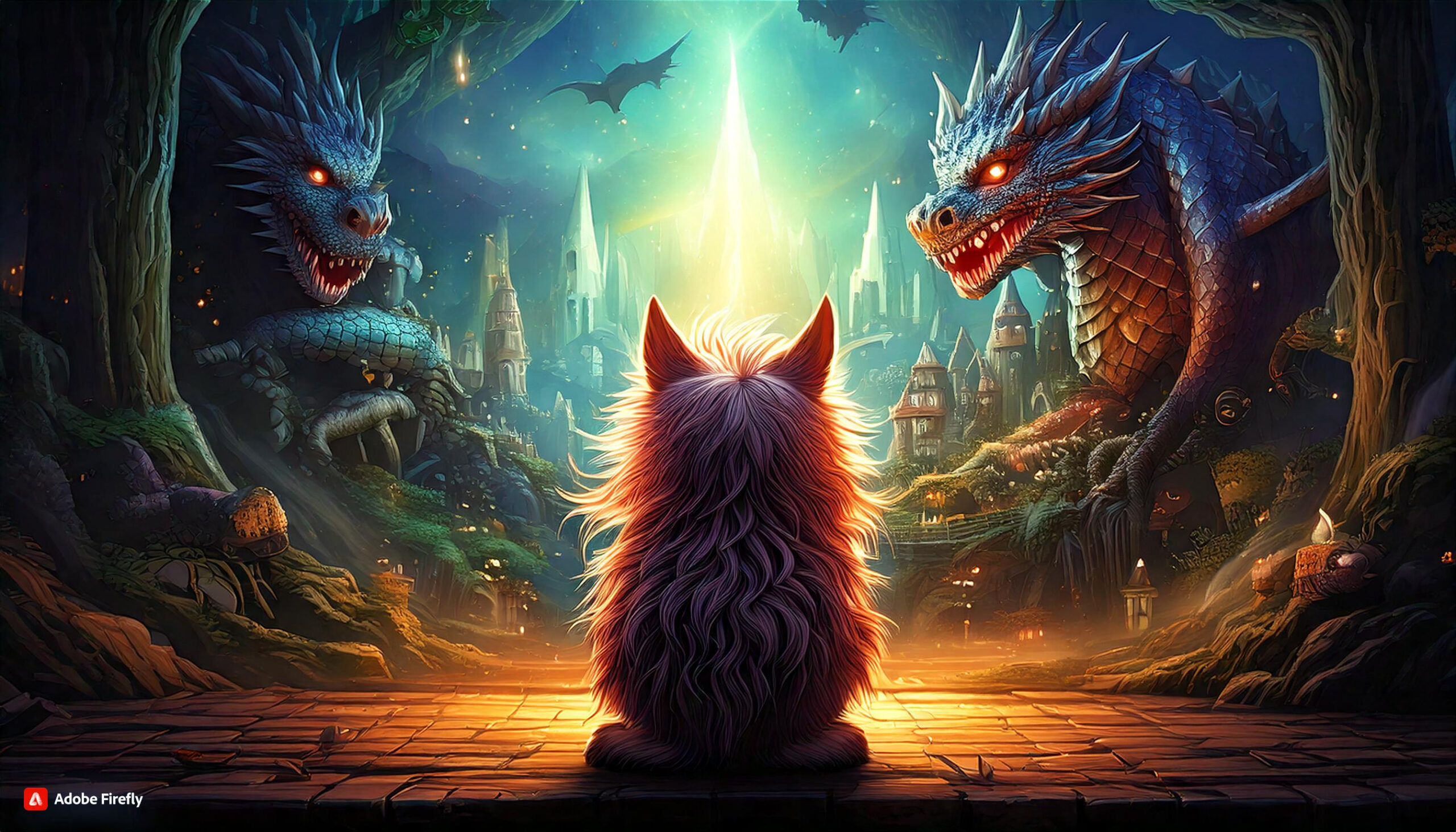So, you have a thing for fantasy stories? Me, too.
Epic sagas from minds like J.R.R. Tolkein, George R.R. Martin, and R.A. Salvatore; series works from writers like Charlaine Harris, Katherine Arden, and Cassandra Clare; one-off dream-vacation-esque dives into worlds created by folks like Erin Morgenstern, Stephen King, and Susanna Clarke. Whatever your mood or reading flavor, fantasy offers a little for everyone, dipping into the speculative while grounded in the real, whether that realness is contemporary, historical, or of an alternate universe. Readers taste a mélange of philosophies and worldviews, take in a host of experiences and characters, champion the creation of literary magic, broadly.
Writing fantasy, though? It’s complicated.
There are few, if any, rigid rules to follow, though there are elements you must include in your story for it to be deemed a work of “fantasy.” And your story must fit somewhere within the fantasy genre if you intend to reach fantasy readers.
So, where to begin?

Magical must-have #1: Magic
“Magic” refers to the stuff that exists in your story that does not or cannot exist in the real world. Sorcery, witchcraft, and enchantment; cryptids and fantastical creatures of the imagination; superhuman abilities and powers — really, anything that cannot be explained away with empiricism or logic. In fantasy stories, magic is the author’s playground. And when you play with magic, you have a chance to showcase the uniqueness of your story.
Magic in fantasy stories must play a key role in solving problems (and likely creating them) for the characters tasked with using such magic. Using new and innovative magic systems, giving your characters something completely imaginative to use, can set your story apart from others like it. Magic should do more than other tools in your story. It should also be a source of conflict, a plot driver, a way to usher in character development, or something else. And to become more than a tool, the magic must have rules. You, author, must rigidly adhere to those rules, even if and when your characters would rather the rules not exist.
The idea of a force, or mana, persists in fantasy stories, though Allan Maurer and Renee Wright point out, in Writing Fantasy & Science Fiction, that, “The ability to tap into this magical force, or mana, is almost always extremely limited. Everywhere, tradition binds magic, ruling its access and use, and magical power traditionally lies in the knowledge of spells and rites.” When creating your fantasy story, consider what kind of magic your characters will have access to, what kind of magic exists that they cannot access (or cannot access, yet), and how your magically inclined characters will learn everything they need to know about their magic.
Magical must-have #2: A Sense of Place
In fantasy fiction, the magic is as great as the space in which the magical use such magic. To provide a well-developed and immersive space into which to thrust your magical characters, you must engage in world building — the creation of a robust world from the ground up. “World building” refers to the process of exploring and explaining the depth and detail of the world in which your characters live — everything from socio-cultural structures and attitudes, the provision of education, class systems, language, holidays, and traditions.
World building in fantasy stories is more than simply commenting on the weather or technology to give your reader a sense of time. World building is about giving your reader a sense of place and space. Creating the world includes elements like class organization, structures like feudalism, manorialism, and religious societies; resources and resource allocation, including trade, between and within cultures; cultural identification of magic practitioners — witches, mages, wizards, shamans, oracles, and the like — from their basic human counterparts; and the meteing out of justice, including imprisonment, magical castration, and other types of binding.
When building your world, consider the folks — magical and non-magical — who live there. How and why do they organize themselves? How do they share? From where and from whom do they hoard? Which resources are native to each area? How do those resources move and get distributed? What items are considered frivolous, or special treats? What items are considered essential to a life well-lived? What are their holidays and traditions? From which old stories do those traditions come?
By understanding how and why the folks in your world move and operate, you’ll understand the intrinsic state of being human or being magical in such a world.
Magical must-have #3: Conflicted Characters
In fantasy fiction, the magic can’t be a peripheral element; rather, magic must be central to the main conflicts and the characters involved in those conflicts. Think about Lord Voldemort — and how his use of magic resulted in the splintering of his soul via horcruxes. Or Sauron — and how the power placed in each of the golden rings corrupted those who wore them. Or Matilda — and how she put others at risk of punishment by using magic to protect herself. In stories, the use or misuse of magic almost always comes with huge consequences. For the person using the magic, yes. But also, for others involved in or around such magical use, even those considered magical collateral damage.
When writing your magical characters into their stories, make sure each of your characters has a goal, motivation to achieve the goal, and a central conflict which stops them from achieving the goal at all or right away. But beyond the basics, each character should have a complex or complicated relationship with magical people or magic, broadly. Harry Potter almost died because of dark magic. Middle Earth was nearly razed until Isildur cut off Sauron’s finger. Ms. Honey almost got into serious trouble for breaking and entering because Matilda wanted to get her old doll.
Using magic immediately raises the stakes for the characters in your story because we simple humans don’t have magic wands and spells to cast to make things happen. I mean, it’d be pretty awesome to have a patronus, but alas! Make sure your characters are real and flawed, that they both revere and fear magic. Give each character a magical thing they love and a magical thing that they’d rather didn’t exist.
How do these items clarify your character’s intrinsic needs, their relationships with themselves and others? How does magic affect the way they live, work, and play? How does it increase conflict in their lives? How does it resolve conflict?
Magical must-have #4: Government Power Structure
Magic doesn’t exist in a vacuum. Even Superman had Ultra-Humanite and Lex Luthor with whom to contend. Because your magical hero will need a magical or otherworldly villain to fight, there must exist a socio-political governmental organization of some kind under which all characters operate. You know, like any modern civilization. While many of us dream of total anarchy, we also acknowledge that we live in a society with a leadership hierarchy, whether we like it or not.
While you may not need to completely design and define all the branches of your government and all the players and faces in your government, you can benefit your writing process by thinking through what a system of government may look like. When governmental power structures are a central part of your fantasy story, a character’s fight against such power structures naturally follows. For example, if your characters perform magic in secret because magic has been outlawed, then consider whether your characters may benefit from a speakeasy of sorts for common folks to gain access to magic — and a Magical CIA to weed out and imprison the mages who threaten the control of such power.
What is the ruling hierarchy of your magical government system? Who sits in the very top seat? How are magical rules and regulations decided? What kinds of law enforcement exist to stop those who harm? When harm does happen, who responds? How are the bad guys held accountable for their deeds? How are the good guys rewarded? And how easy is it to tell the difference between the bad guys and the good guys?
TL;DR: Fantasy stories are defined by magic, so define the magic in your story and its effects on your characters and world.
If scientific innovation defines science-fiction, then magic defines fantasy. As such, all the elements in your story must affect or be affected by magic. And remember Newton’s third law of motion: for every action, there is an equal but opposite reaction.
For all the good mages, identify the not-so-good ones.
For every good and beneficial use of magic, define the not-so-good uses.
For all the magical justice present, disclose when such justice is impossible due to corruption, or negligence.
Fit the magic into your world, but make sure your world and all those who live there are strong enough to carry the weight of that magic lest it crush them.
Want more? My colleague, Kristin Noland, recently put together 10 Tips for Fantasy Authors. Best of all, many of her tips are universal, so you may find a golden nugget in there even if you don’t write fantasy or aren’t writing a fantasy story right now.
Happy writing!
<3 Fal
Prefer video?
Join me on MetaStellar’s YouTube channel:

Fallon Clark is the book pal who helps you tell your story in your words and voice using editorial, coaching, writing, and project management expertise for revision assistance, one-on-one guidance, and ghostwriting for development. Her writing has been published in Flash Fiction Magazine. Check out her website, FallonClark.com, or connect with her on LinkedIn or Substack.

